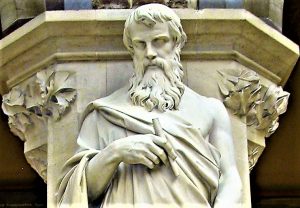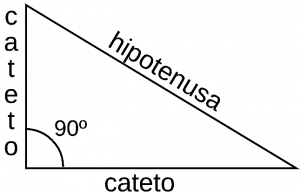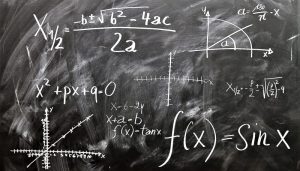Euclid
In the history of geometry, Euclid of Alexandria is the main representative of this science. His contributions to humanity are invaluable and many of them remain today as universal premises. For many mathematicians and geometricians, he is known as the father of geometry. Euclid along with Archimedes and Apolonio of Perga is part of the triad of mathematicians of Antiquity and is one of the most illustrious and best known mathematicians of all time. His most renowned work is "Elements” and is composed of thirteen books that develop different geometric and arithmetic themes, and that have remained unchanged until the 19th century. This work has been as widespread as one of the most important written works of universal literature, as well as the Bible or Don Quixote.

Personal information
- When he was born: 330 B.C.
- Where he was born: Unknown
- When he died: 285 B.C.
- Where did he die: Alexandria, Egypt
Who was Euclid?
Euclid of Alexandria was a Greek mathematician and geometrician born in Alexandria in the 330 B.C. His best-known work is "Elements" which contains significant themes related to geometry and arithmetic. He is known as the father of geometry for his great contributions to the world of geometry and mathematics.
Euclid biography
Little is known about Euclid’s life. He was born in 330 B.C., and he was the son of Naucratis. Some authors claim that he was born and lived in Alexandria, northern Egypt during the reign of Ptolemy I, while others claim that his birth was in Tyre Kingdom and that he lived in Damascus.
It is believed that his education began in Athens, where he was able to acquire, in Plato’s school, great knowledge of geometry and mathematics. He was a teacher at his own school in Alexandria, founder of the Ptolemaic dynasty, during the reign of Ptolemy I – the first Greek Pharaoh, who ruled Egypt from 305 BC to 285 BC.
In his life, he was able to develop several discoveries and compile in his works all the advances that existed on the geometry and arithmetic of his time.
“Elements“ is his best-known work and contains 465 propositions, 93 problems and 372 theorems in thirteen volumes. He also wrote other works related to thought, music and optics.
According to research, Euclid’s death occurred in 265 B.C.
Discoveries
In his life, Euclid made several important discoveries in the theory of numbers as his well-known algorithm for the calculation of the maximum common divisor of two numbers; in the field of geometry with its axioms and the set of books that make up the work entitled “Elements“.
Contributions
His work includes several contributions that have been of great importance for the development of the study of geometry: these are: “Elements“, the “Euclidian Algorithm“, the “Euclidian Geometry“, the “Mathematics and Demonstration” and the Axiomatic Methods.
Elements
It is Euclid’s best-known contribution and is made up of 465 propositions, 93 problems and 372 theorems that include the most important mathematical and geometric developments of his time. In this work, we find the 5 Euclidian postulates and the Euclidian algorithm.
The books from I to VI develop themes of flat geometry; the books from VII to X deal with topics of arithmetic by presenting the theory of numbers and irrational segments; the books from XI to XIII explain spatial geometry.
The Euclid algorithm
In this algorithm, Euclid describes the method for finding the greatest common divisor between two numbers. This work has been of great importance to mathematics and has been applied in other fields such as economics.
Euclidean geometry
The contributions developed by Euclid’s in the field of geometry have dominated the study of this science for almost two millennia, especially in the areas of flat geometry and spatial geometry.
Euclidean geometry, besides being a valuable tool for deductive reasoning, has been used in other fields of knowledge such as physics, mathematics, astronomy, chemistry and different branches of engineering.
Demonstration
Euclid, like Archimedes and Apollonius, perfected the process of mathematical demonstration, as a chained argument, in such a significant way that today its use in modern mathematics is indispensable.
Axiomatic methods
The axioms posed by Euclid in his work “Elements” pose a global perspective of the axiom that motivated the development of this fundamental area of modern mathematics.
Works by Euclid
Euclid produced many treatises on geometry and other sciences. However, his best-known work is called “Elements” and consists of 13 books that compile works by other authors and him and where they touch on the themes of flat or elementary geometry, theorems of numbers and spatial geometry. In addition to developing in arithmetic and geometry, Euclid has a work entitled “Sophisms” and writings on music and optics.
Euclid postulates
Euclid developed in the area of geometry a set of axioms that he later called postulates. These are five and we will present them below:
- Postulate 1: “Given two points, a line can be drawn that joins them.”
- Postulate 2: “Any segment can be continuously prolonged in an unlimited line in the same direction.”
- Postulate 3: “A center circumference can be drawn at any point and any radius.”
- Postulate 4: “All right angles are equal.”
- Postulate 5: “If a straight line, when cutting two others, forms the internal angles of the same side smaller than two straight lines, those two straight lines prolonged indefinitely are cut from the side on which are the angles smaller than two straight lines. This axiom is also known as the axiom of parallels.
Phrases
Here are some of Euclid’s best-known phrases. These are:
- What is asserted without proof, can be denied without proof
- Freedom is not an end; it is a means to develop our forces.
- Reason is a means to get to the truth
- Success is not for what they think they can do, but for those who do.
- There is no real way to Geometry
How to cite this article?
Briceño V., Gabriela. (2019). Euclid. Recovered on 24 February, 2024, de Euston96: https://www.euston96.com/en/euclid/









